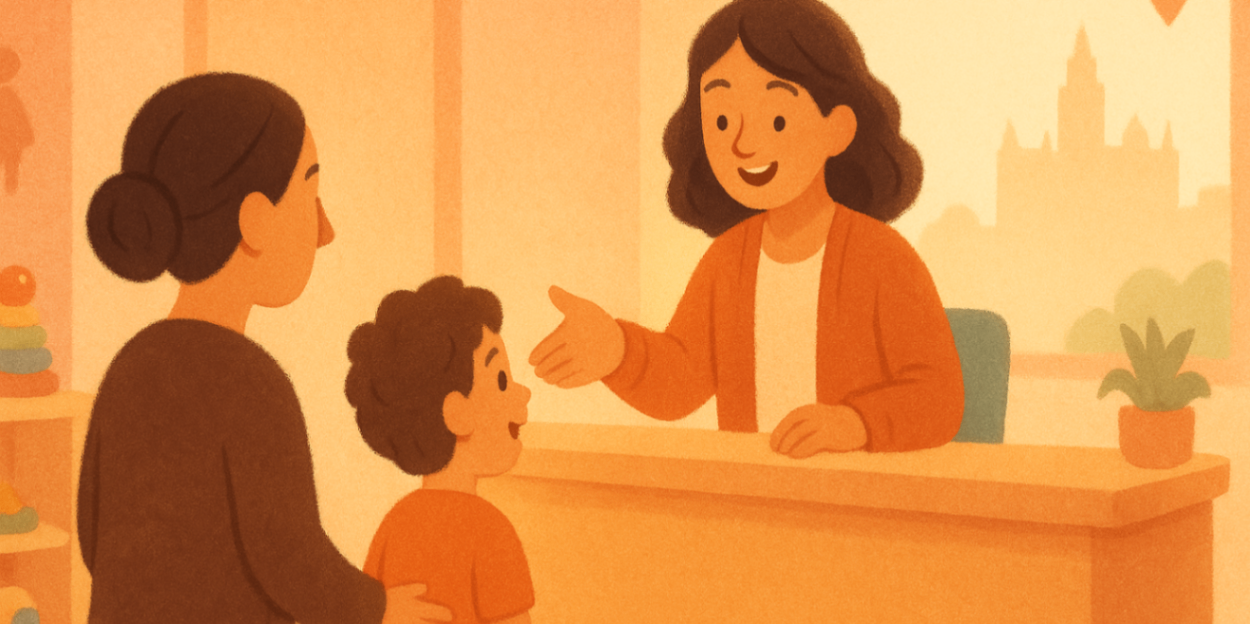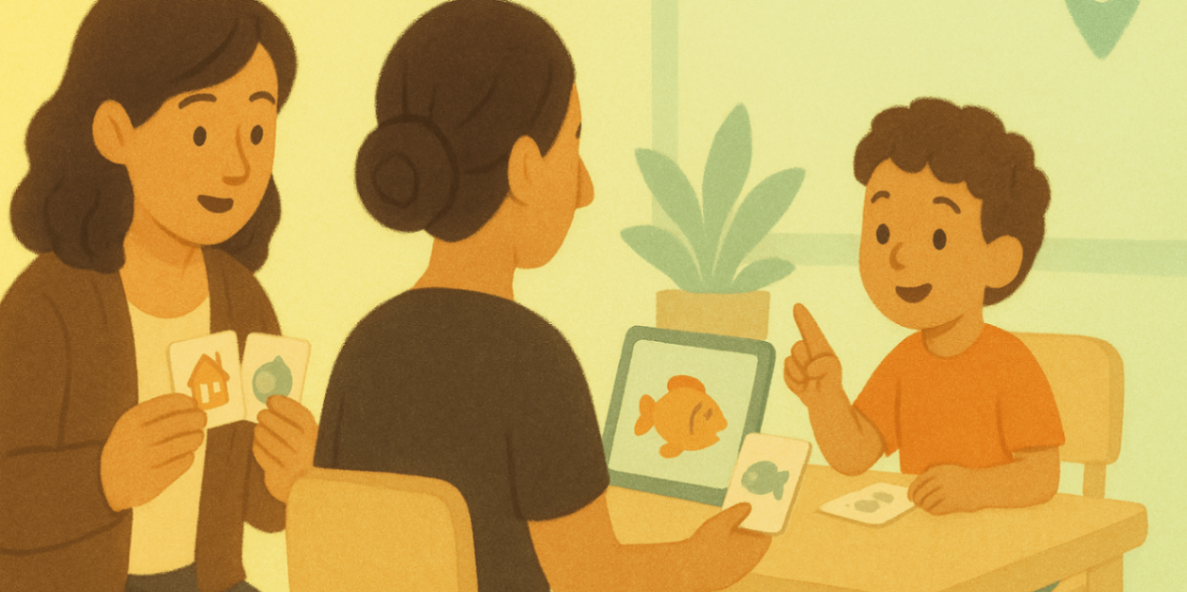
speech delay therapy liverpool: how ndis helps children catch up
29 August, 2025
Early intervention and a tailored plan from a qualified clinician improve outcomes for children with speech and language needs. NDIS funding can support assessments, regular sessions and parent training — and local clinic or in-home options make accessing care in Liverpool manageable.
Key Highlights
-
Early Intervention: Addressing speech delays early with speech delay therapy significantly improves a child's long-term outcomes.
-
NDIS Support: The National Disability Insurance Scheme (NDIS) can provide funding for essential speech pathology services in Liverpool.
-
Professional Guidance: A certified speech pathologist is crucial for assessing your child's needs and creating a tailored therapy plan.
-
Skill Development: Therapy focuses on enhancing communication skills, boosting confidence, and improving overall quality of life.
-
Local Access: Families in Liverpool have access to specialised clinic-based and mobile speech therapy services.
-
Parental Role: Active family involvement is key to reinforcing progress made during therapy sessions.
Understanding Speech Delays in Children

A speech delay occurs when a child’s spoken sounds or language understanding fall behind typical developmental pathways. Speech relates to the production of sounds, while language is about understanding and using words and sentences. If you’re concerned, early assessment speeds access to targeted supports and tailored intervention.
Are you worried that your child is not reaching the usual steps in communication? Seeing signs of a speech delay early helps kids get support when they need it. Having problems with making sounds or with using language can make it tough for a child to be with others and to learn. If you see that your child has trouble talking with people their age, it might be time to try speech therapy. The right help can make a big difference in their language development and growth.
Recognising Speech Delay in Children: Key Signs Parents Should Watch For
Spotting the signs of a speech delay can help you act fast. Some things to look for are low speech clarity, ongoing language problems, or trouble with social communication. If you see these things happen, it's very important for you to act early.
After you see these signs, be sure to search for a professional. How do you pick the best speech pathologist in Liverpool to help with your child's speech delay? You should look for the one who is skilled and has the right qualifications. This person should know how to check your child’s unique needs and make a plan that fits just for them. The next sections will talk about some big warning signs. This will help you know when you need to get expert help.
Common Communication Red Flags by Age Group
As your child grows up, how they speak and understand others should get better. You can keep track of where your child is with communication skills by checking certain steps, called developmental milestones. Every child moves at their own speed. Even so, most kids reach important points around the same age. If you wonder when your child may need help for a speech delay, pay attention to when their progress does not match these usual milestones.
If your child is not hitting these points, it may mean their speech is not where it should be. Here are some simple milestones to watch for:
-
0-12 months: At this time, your baby should respond to sounds, start to make baby noises or babble, and know voices they have heard before.
-
12-24 months: Your toddler should say their first word or words, put two words together, and follow easy instructions.
-
2-3 years: The number of words your child knows should jump up fast. They should talk in short sentences and use words like "I," "me," or "you."
-
4-5 years: Your child should use full sentences, speak with you or other people, and people should be able to understand most of what your child says.
If you see that your child often misses these markers, this may show the need to get professional advice. When problems with child’s speech or language challenges are found early, you get to help faster. Seeing an expert soon also
Social and Behavioral Indicators of Speech Delay
Speech delays do not always show up as problems with words. There can be other signs that a child has communication problems. The way your child acts can be a clue if they have trouble with social communication or their language skills. Problems with talking and listening may make it hard for them to build friendships or feel good with other people. These language problems can also make them pull away or feel upset in social situations.
Watching how your child talks and acts with others can give clues to help spot issues. Here are some common signs to look for that show a child might have a speech delay:
-
The child may struggle to make or hold eye contact when talking.
-
The child may find it hard to take part in simple back-and-forth talk with people.
-
The child may not be able to follow group rules when playing with others.
-
The child may seem frustrated or not want to play or interact with others their age.
If you see these signs in your kid, it is important to look into ways to get help. What options are there in Liverpool for speech delay therapy for children? Professionals offer many ways that work on both speech and the social skills children need to talk and play with others with confidence.
What Is Speech Delay Therapy?
Speech delay therapy is a way to help children who have trouble with speaking or understanding words. A speech pathologist leads the therapy. This person checks to see where the child has problems and makes a plan to help them get better at talking. Speech therapy services work on things like helping the child say words right and understand what others say better.
In Liverpool, there are different types of speech delay therapy. Some use play as part of the work. Some focus on how to say words, and some help your child build their use of language. The aim is to make talking every day easier and more fun for the child. It also helps them feel more sure of themselves when expressing what they want to say. The next parts will tell you about what therapists do and what special techniques they use.
Role of a speech therapist vs speech pathologist
In Australia, the terms "speech therapist" and "speech pathologist" are often used interchangeably to describe professionals who diagnose and treat communication disorders. These certified practising speech pathologists are highly trained experts who evaluate your child's speech, language, and swallowing abilities. Their primary role is to develop effective therapy plans tailored to your child's needs.
When considering a professional, it's natural to ask, "What qualifications should a speech therapist in Liverpool have for treating children?" A qualified professional should hold a recognised degree in speech pathology, be registered with Speech Pathology Australia, and have experience working with children. They use evidence-based techniques to help your child achieve their communication goals.
The functions of these professionals are comprehensive, covering assessment, treatment, and support. Here’s a breakdown of their key responsibilities:
|
Role/Function |
Description |
|---|---|
|
Assessment |
Conducts thorough evaluations of speech, language, interaction, and swallowing skills to identify areas of concern. |
|
Therapy Planning |
Develops customised therapy plans with specific, measurable goals based on the assessment and the child’s needs. |
|
Treatment |
Delivers structured therapy sessions using proven techniques to improve articulation, language proficiency, and social interaction. |
|
Training & Support |
Provides training and strategies for families and caregivers to support the child's progress at home and in other settings. |
Techniques used in therapy (play-based, articulation, language skills)
Effective speech therapy uses many proven methods to help make learning fun for children. Most therapists use play-based therapy. In this approach, children learn communication skills and language in a relaxed and playful way. This method is important for early intervention. It helps kids build key skills without the stress.
Therapists pick special methods to help with things like how your child says words and how smoothly they speak. Therapy sessions can be one-on-one or with others, based on your child's needs. If you have a child in Liverpool and you want to know about group speech therapy sessions, yes, there are options. Group sessions help your child practice social communication skills with other kids.
Some well-known techniques include:
-
PROMPT: This technique uses touches on your child’s face to guide them to make correct sounds.
-
Lidcombe Program: This is used for stuttering. Parents play a part by giving their child positive feedback.
-
Dynamic Temporal and Tactile Cueing (DTTC): This method gives strong support for serious speech movement issues, like apraxia of speech.
-
Rapid Syllable Transition Treatment (ReST): Here, your child will practice making quick, clear shifts between different speech sounds.
These treatment styles let the therapist focus care on exactly what your child needs. They work to help your child speak clearly and have confidence when they talk. All are good ways to build stronger language skills, communication skills, and social communication abilities
How NDIS Supports Speech Therapy

The National Disability Insurance Scheme (NDIS) helps families get support that they need. If you worry about the price of therapy, you may wonder, "Can the NDIS pay for speech delay therapy in Liverpool?" Most times, the answer is yes. The NDIS can give you money for speech pathology services. It does this when the help is seen as needed and helps your child meet important developmental goals.
This help from the NDIS can make your child's communication better. It can also help your child take part more in social settings and enjoy a better quality of life. When the plans pay for therapy, children with developmental delays get the help they need sooner. The next part below will explain how NDIS money for therapy is set up.
With the NDIS, the cost of speech pathology services does not need to be a problem for families seeking help to improve quality of life.
NDIS funding categories for speech therapy
Navigating NDIS funding can seem complex, but it's structured to cover the specific therapy services your child needs. Funding is allocated under different support categories in your child's NDIS plan, most commonly "Improved Daily Living." This category is intended for therapies that build skills and independence, which includes speech therapy. While some families may use private health insurance, NDIS funding is a primary source of support for many.
To access these funds, you do not need a medical referral to see a speech pathologist, but you must be an NDIS participant with an approved plan. The therapy process starts with an assessment, which helps justify the need for ongoing therapy services in your plan.
NDIS funding is designed to cover a comprehensive range of services that contribute to your child's progress. Here’s what it typically includes:
|
NDIS Support Area |
Description of Services |
|---|---|
|
Assessments |
Comprehensive evaluations to understand your child's speech and language abilities and recommend appropriate support. |
|
Therapy Sessions |
Regular one-on-one or group sessions with a qualified speech pathologist to work on specific communication goals. |
|
Therapy Plans |
The development and review of individualised plans that outline therapy goals and strategies. |
|
Caregiver Training |
Training for parents, family members, and educators to help them implement strategies and support the child's progress at home and school. |
Parent training and home practice strategies
Your involvement in your child’s therapy is important. Many people say and research shows the more you take part, the faster your child will get better. This is why parent training and home practice are a big part of speech therapy. Therapists will show you ways to keep working on language development between therapy sessions. You can use everyday situations to help your child learn. These exercises help all the skills your child learns to work in different places.
If you want to start, you might ask, “How do I get a speech therapy assessment in Liverpool?” The first thing to do is contact a local clinic or therapy provider. Their team will talk to you about your child’s development and ask some starting questions. After this, they will likely offer a full speech therapy assessment to see your child’s strengths and areas that need help.
Speech Therapy in Liverpool: Local Access Matters

Having easy access to speech therapy in Liverpool can really help families. Being local means you do not have to travel far for therapy sessions. This helps cut stress for parents and makes it easier to keep up with your child’s progress at all times. You can find speech therapy services and speech pathology experts right here in Liverpool. These therapy services focus on early care, so your child can get help close to home.
When you look for speech therapy or speech pathology services in this area, you will see many who care about your child’s needs. They offer speech therapy services that fit your family. You can get help at their clinic, which is set up just for this, or a therapist can come to your home. These options make it easy to use therapy sessions in a way that works for you and your child.
In-clinic sessions at daar
Clinic-based therapy gives your child a safe and well-organised space made just for their needs. In a dedicated clinic, there is often a wide range of special tools and resources that you might not have at home. These places have things like individual rooms for treatment and sometimes even therapy kitchens. This helps make a focused spot where your child can get speech therapy and other needed therapy services.
We regularly support families from Liverpool suburbs such as Liverpool, Moorebank, Casula, Prestons, Lurnea, Miller, Edmondson Park, and Mount Pritchard, as well as Canterbury-area suburbs including Canterbury, Campsie, Belmore, Lakemba, Earlwood, Punchbowl, Hurlstone Park, and Bankstown.
The place is built so it feels welcoming and helps your child do their best. Clinic-based therapy sessions happen somewhere free of everyday noise and other things that could draw attention away from the work. Here, the therapist uses advanced tools—some examples are eye-gaze tech and switch-adapted toys—to help your child make progress in each session. You can have peace of mind knowing your child gets focused attention and good speech therapy services.
In-home speech therapy across Liverpool & Canterbury
For many families, in-home therapy gives them more freedom and comfort. Mobile speech pathology services let expert care come right to your door in Liverpool, Canterbury, and places nearby. This way, your child learns and practices new skills in the place where they live. It can be easier for them to use these skills each day. The therapist works with you to make therapy plans that fit into your family's routine with no trouble.
Our mobile team visits homes across Liverpool suburbs (for example: Liverpool, Moorebank, Casula, Prestons, Lurnea, Miller, Edmondson Park, Mount Pritchard) and Canterbury-area suburbs (for example: Canterbury, Campsie, Belmore, Lakemba, Earlwood, Punchbowl, Hurlstone Park, Bankstown), bringing therapy to the environments where your child spends their day.
In-home therapy is set up to help with your child’s unique needs, just like when you go to a clinic. Sometimes, a child's delays are not only about speech. This might make parents ask, "What is the difference between speech therapy and occupational therapy for children with delays in Liverpool?" Speech therapy helps with talking and communication, but occupational therapy helps with fine motor skills, how they handle feelings and senses, and things they do each day.
Conclusion
Early intervention for speech delays is vital to a child’s growth, learning, and future communication skills. With the NDIS, families can access the right speech therapy supports to give their child the best chance to thrive. By recognising the signs early, working with experts, and practicing strategies at home, parents can make a lasting difference in their child’s development.
Book your consultation with daar Liverpool today and explore how our NDIS-funded speech therapy services can support your child’s speech journey and set them up for success.
Frequently Asked Questions
Is speech therapy for speech delay covered by NDIS?
Yes, the NDIS can help to pay for speech therapy if your child has a speech delay. The NDIS will cover speech pathology if it is seen as a reasonable and necessary support. This helps your child reach their goals. You can use your NDIS therapy funding for these important services.
How long does it take for a child to catch up with speech therapy?
How long it takes will depend on the child’s development. It also matters what kind of speech delay the child has, and how often they have therapy sessions. Early intervention helps because it can make progress happen faster. The therapy process is made to fit each child and the speed at which they learn.
Do I need a referral for NDIS speech therapy?
You do not have to get a doctor's note to visit a speech therapist. For speech therapy paid by NDIS, you need to be an NDIS participant with a plan there. The first step is to apply for NDIS. After that, you should make sure there is money set aside for therapy services in your plan.
.svg)






